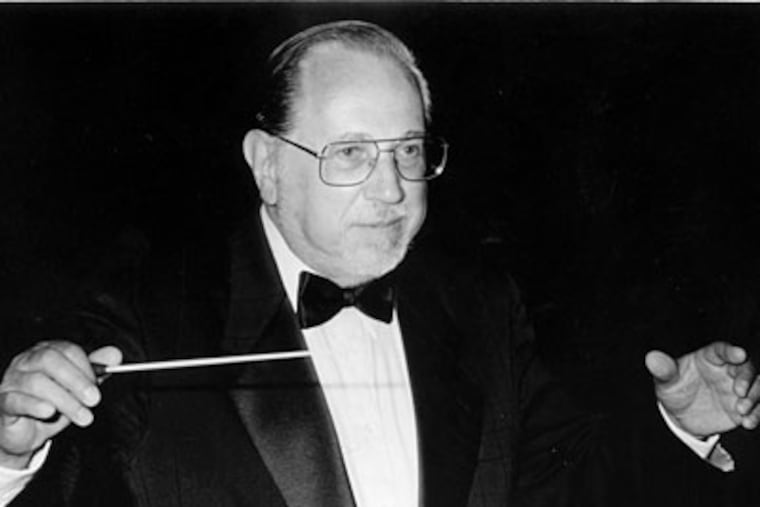Musician Irving Ludwig dies at 83
Irving Ludwig, 83, of Ardmore, longtime violinist of the Philadelphia Orchestra and music director of the Lansdowne Symphony Orchestra, died Tuesday at the Hospital of the University of Pennsylvania after a 19-year battle with lymphoma.

Irving Ludwig, 83, of Ardmore, longtime violinist of the Philadelphia Orchestra and music director of the Lansdowne Symphony Orchestra, died Tuesday at the Hospital of the University of Pennsylvania after a 19-year battle with lymphoma.
"Music and family was the center of his life. They were inextricably intertwined," said his son Mark Ludwig, now a violist with the Boston Symphony Orchestra. To that end, Mark and his violinist brother Michael (now concertmaster of the Buffalo Philharmonic) played Mozart's Sinfonia Concertante under their father's baton to celebrate his 80th birthday with the Lansdowne orchestra.
"Irving often spoke of destiny, that our coming together as a group, this orchestra . . . was somehow meant to be," said orchestra member Arthur Gutzler. "While our audiences hear the music, only the musicians really understand the depth of the relationship that we had."
Mr. Ludwig was born in Philadelphia to Ukrainian Jewish parents, both of whom were widowed and had fled pre-World War I anti-Semitism in Russia. As a talented student, he studied at the Settlement Music School and often played chamber music with his cousin, cellist Jules Eskin, who went on to become the Boston Symphony's principal cellist.
By age 20, he was a member of the National Symphony Orchestra; he moved up to the Philadelphia Orchestra in 1949. His 39-year tenure was interrupted in 1950 by four years with the U.S. Navy Band during the Korean War. During this period in Washington, D.C., he met his future wife, Martha. At the time of his death, they had been married 61 years.
During his tenure with the Philadelphia Orchestra, from 1954 to 1990, he often invited guest soloists such as pianists Vladimir Ashkenazy and Earl Wild home for dinner and long evenings of chamber music.
Orchestral musicians don't necessarily have an individual sound, but Mr. Ludwig did. Michael Ludwig, who could always pick out his father in recordings, said, "It was like it was his voice. His sound was so personal - as in the greatest artists."
By the mid-1970s, Mr. Ludwig was also conducting chamber orchestra concerts - he was among the founders of the New Y Chamber Players - with works such as Bach's Brandenburg Concertos and Grieg's Holberg Suite, though without formal conducting training. His 1990 retirement from the orchestra, which came when arthritis kept him from giving his best (violin pedagogue Raphael Bronstein once said, "With Ludwig, there is no compromise") was closely followed by his 1991 appointment to the Lansdowne orchestra.
Mr. Ludwig groused about the irregular rehearsal attendance of the all-volunteer orchestra, and held the ensemble to a high standard, telling players - according to oboist Harold Goldner - "Eugene Ormandy was harder on the Philadelphia Orchestra than I am on you!" He's credited with raising the group into one of the better orchestras of its kind in the area.
"Retirement may have been the most fruitful period of his life, musically," said Mark Ludwig of his father.
His son Michael became a member of the Philadelphia Orchestra (later moving to Buffalo), and Mark founded the Terezin Chamber Music Foundation to promote the music of composers who died in the Holocaust. When Mark ran the Musicworks chamber music festival in Pittsfield, Mass., his father was a frequent guest conductor and teacher.
He also was an avid chess player, and twice defeated the longtime New York Times classical music critic Harold C. Schonberg, another chess enthusiast, during the Philadelphia Orchestra's historic 1973 visit to China.
Survivors inlcude his wife, sons, a granddaughter, and two sisters. A public memorial will be held at 5 p.m. April 22, immediately after the Lansdowne Symphony Orchestra's 3 p.m. concert at the Upper Darby Performing Arts Center in Drexel Hill.